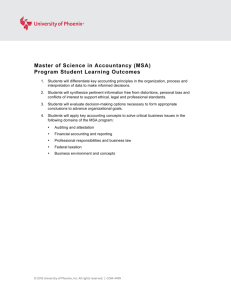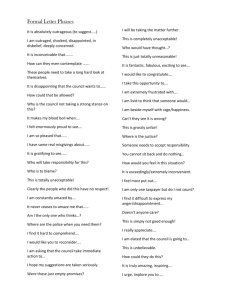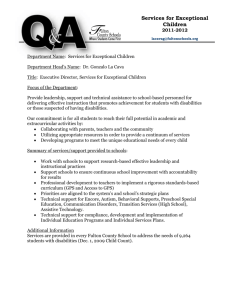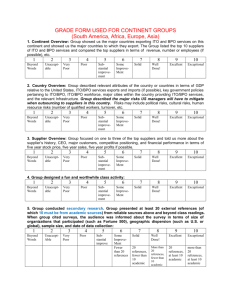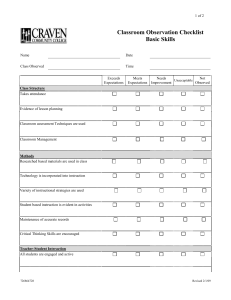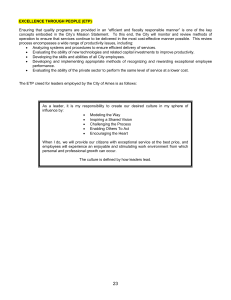Spring 2013 - San Jose State University
advertisement
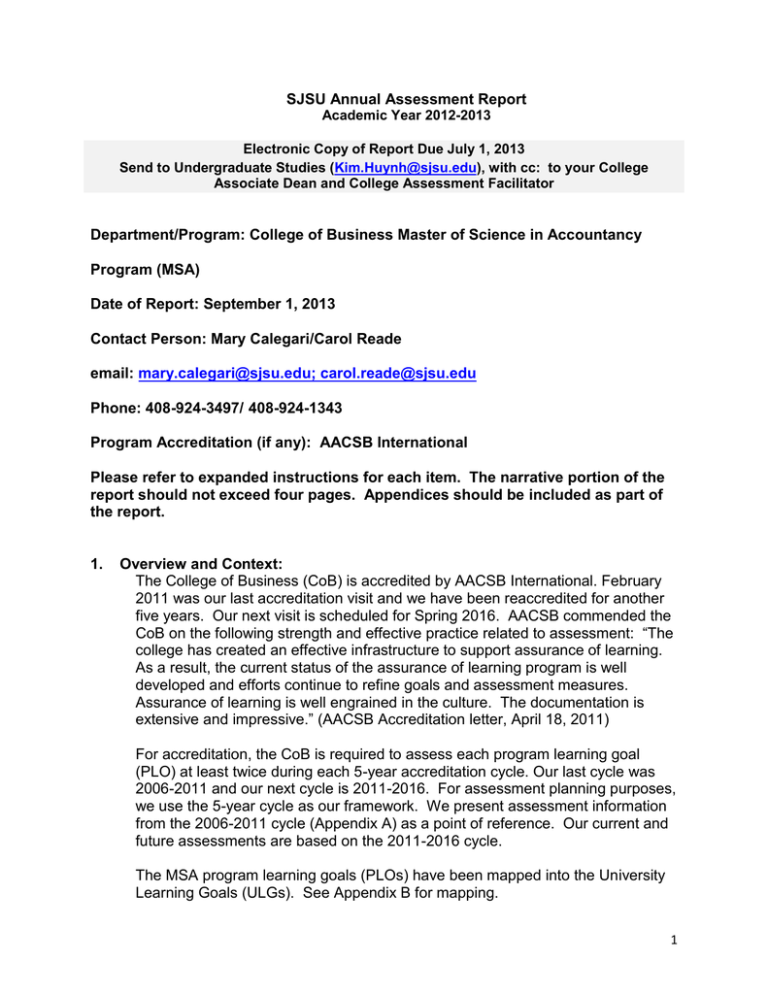
SJSU Annual Assessment Report Academic Year 2012-2013 Electronic Copy of Report Due July 1, 2013 Send to Undergraduate Studies (Kim.Huynh@sjsu.edu), with cc: to your College Associate Dean and College Assessment Facilitator Department/Program: College of Business Master of Science in Accountancy Program (MSA) Date of Report: September 1, 2013 Contact Person: Mary Calegari/Carol Reade email: mary.calegari@sjsu.edu; carol.reade@sjsu.edu Phone: 408-924-3497/ 408-924-1343 Program Accreditation (if any): AACSB International Please refer to expanded instructions for each item. The narrative portion of the report should not exceed four pages. Appendices should be included as part of the report. 1. Overview and Context: The College of Business (CoB) is accredited by AACSB International. February 2011 was our last accreditation visit and we have been reaccredited for another five years. Our next visit is scheduled for Spring 2016. AACSB commended the CoB on the following strength and effective practice related to assessment: “The college has created an effective infrastructure to support assurance of learning. As a result, the current status of the assurance of learning program is well developed and efforts continue to refine goals and assessment measures. Assurance of learning is well engrained in the culture. The documentation is extensive and impressive.” (AACSB Accreditation letter, April 18, 2011) For accreditation, the CoB is required to assess each program learning goal (PLO) at least twice during each 5-year accreditation cycle. Our last cycle was 2006-2011 and our next cycle is 2011-2016. For assessment planning purposes, we use the 5-year cycle as our framework. We present assessment information from the 2006-2011 cycle (Appendix A) as a point of reference. Our current and future assessments are based on the 2011-2016 cycle. The MSA program learning goals (PLOs) have been mapped into the University Learning Goals (ULGs). See Appendix B for mapping. 1 2. Use of Prior Assessment/Closing the Loop: The following are some “closing the loop” actions for the MSA program: 1. Bus220J – Professional Communications and Relationships was changed to Bus220J – Business Communications and Ethics. An ethics component was added to the course to comply with the new CPA licensure requirements that now require 10 units of ethics. This added emphasis on ethics also aligns with the College’s core value of ethics. 2. Bus220U – IT Audit and Internal Controls was redesigned to better fit the needs of the MSA graduates as they enter the real world. The general idea behind the redesign was to approach IT audit from a business process perspective since this is how firms audit companies and students should understand the business processes and different risks inherent in each process. PwC expressed interest in working with us to create a better course. The course was developed through the coordination of two teams: 1) SJSU team consisting of Professor Ashley Davis and 3 teaching assistants and 2) PwC team consisting of several partners, senior managers, senior consultants, and many of our graduates who joined PwC in the past couple of years. The course redesign included clicker technology in the slides that helped engage the MSA students in the “lecture” portion of the course. SAP was also included as an activity to expose students to the types of systems they may end up working with in their future employment. PwC brought in real world case studies, problems and examples of documents that they use to perform an audit of the business process, and a new version of COSO. The course utilized various approaches to presentation, panel discussions, group presentations, single presenter, junior presenter/senior presenter, etc. Collaboration was also done regarding extra videos and web resources to bring to each chapter. 3. Bus220X – Business Analysis and Valuations Using Financial Statements was revised to include coverage on start-ups. This a very relevant topic especially since SJSU is located in Silicon Valley and many of our MSA graduates will working with start-up firms. This change also aligns with the College’s core value of entrepreneurship. 3. Assessment Data: See Appendix C for Assessment Data Summary Table. 4. Alignment of Course and Program Learning Outcomes: See Appendix D for Curriculum Alignment Matrix. 5. Recommendations for Student Learning: Starting January 1, 2017, an accounting ethics course is required for CPA licensure. To comply with this new licensure requirement, a proposal was submitted to PwC in February 2013 to develop an Accounting Ethics course for the MSA program. The new course development will be done during the 2 academic year 2013-2014. The new course will be developed as an online course. Beginning January 1, 2014, CPA licensure requires 150 semester units consisting of a baccalaureate degree (120 units) plus 30 additional units. To better serve our undergraduate accounting students, changes are being proposed for the MSA program to change it from a 45-unit program to a 30-unit program. These changes will be done in the academic year 2013-2014. 6. Plans 2013-14 Academic Year: The following program learning goals will be assessed in the 2013-2014 Academic Year: PLO #6: Legal and Ethical Implications of Accounting Practice 3 APPENDIX A ASSESSMENT SUMMARY FOR MSA PROGRAM 2006-2011 ACCREDITATION CYCLE 4 PROGRAM: MSA (Master of Science in Accountancy) Student Learning Outcomes 1. Financial Reporting & Interpretation To understand and apply accounting processes and principles in the preparation and interpretation of financial reports within the context of a complex business environment. Which Courses Measured, When and What Tool Used? Summer 2005 BUS220A – Core Concepts in Accounting: Practice set, in-class examinations Fall 2008. BUS220E – Financial Reporting and Analysis 1. Assignment questions Targets for Satisfactory Performance N=28 Exceptional: 90%100% Acceptable: 80%-89% Unacceptable: 0%79% Fall 2009. BUS220E - Financial Reporting and Analysis 1: Assignment questions (with global components) administered in two parts (Assignment #1 & #2) To understand and apply basic rules of the federal income tax law. Fall 2008. BUS220G-Tax Factors of Business and Investment Decisions Final examination questions. Exceptional: 10/28=35% Acceptable: 17/28= 61% Unacceptable: 1/28= 4% N=24 Acceptable and above: 100% Exceptional: 24/24=100% Acceptable:0 Unacceptable:0 N=23 When and By Whom Were the Results Analyzed? Analysis done in Fall 2005 by Professor Ginny Grace. Results were reviewed by MSA financial reporting faculty. Summary and reports prepared by Professor Mary Calegari. Results were reviewed by MSA faculty Acceptable and above: 91% Exceptional: 19/23= 82% Acceptable: 2/23= 9% Unacceptable: 2/23= 9% Class average: 95% Mean score: 21 points N=31 Fall 2010 BUS220E_Financial Reporting and Analysis 1 Assignment questions 2. Federal Income Tax Law Observations of Student Performance Exceptional: 27/23= 87% Acceptable: 3/23= 10% Unacceptable:12/23= 3% Exceptional: 8-9 Acceptable: 7 Unacceptable: 0-6 N=24 Exceptional:23/24=96% Acceptable: 1/24=4% Unacceptable: 0/24=0% Summary and reports prepared by Thomas Moschetti, reviewed by program faculty, college and assessment 5 PROGRAM: MSA (Master of Science in Accountancy) Student Learning Outcomes Which Courses Measured, When and What Tool Used? Fall 2009. BUS220G-Tax Factors of Business and Investment Decisions Final examination questions. 3. Technology & Internal Controls To understand information technology and internal control processes and their role in financial and managerial reporting Targets for Satisfactory Performance Exceptional: 8-9 Acceptable: 7 Unacceptable: 0-6 Summer 2010. BUS220G-Tax Factors of Business and Investment Decisions Final examination questions. Exceptional: 8-9 Acceptable: 7 Unacceptable: 0-6 Fall 2006. BUS220U: Advanced Accounting Information Systems (former course name is Issues in ECommerce): Practice sets in Access and examination questions administered Exceptional: 90-100% Acceptable: 70-89% Unacceptable: 0-69% Fall 2006. BUS220C: Accounting Information Systems: Embedded exam questions and exercises Observations of Student Performance N=23 When and By Whom Were the Results Analyzed? committtees Acceptable and above: 96% Exceptional: 19/23=83% Acceptable: 3/23=13% Unacceptable: 1/23=4% N=31 Acceptable and above: 94% Exceptional: 26/31=84% Acceptable: 3/31=10% Unacceptable: 2/31=6% On average, 89% of 24 students in the class performed at Exceptional or Acceptable levels (80% and above). Results were acceptable. BUS220C N=24 Application: Exceptional: 13/24=54% Acceptable: 7/24=29% Unacceptable: 4/24=17% Summary and reports prepared by Professor Laura Ingraham, reviewed by program faculty and college and assessment committees. Conceptual Understanding: Exceptional: 20/24=83% Acceptable: 4/34=17% Unacceptable: 0/24=0% 6 PROGRAM: MSA (Master of Science in Accountancy) Student Learning Outcomes Which Courses Measured, When and What Tool Used? Targets for Satisfactory Performance Observations of Student Performance When and By Whom Were the Results Analyzed? Technology Infrastructure: Exceptional: 16/24=67% Acceptable: 5/24=21% Unacceptable: 3/24=12% Internal Control: Exceptional: 13/24=54% Acceptable: 7/24=29% Unacceptable: 4/24=17% N=23 Working with Software Programs: Exceptional: 15/23=65% Acceptab5e: 6/23=26% Unacceptable: 2/23=9% Summer 2007. BUS220U: Advanced Accounting Information Systems: Assignment questions, essay questions, presentation. Summer 2008. BUS220U: Advanced Accounting Information Systems: Assignment questions, essay questions, presentation. Summer 2009. BUS220U: Advanced Accounting Information Systems: Assignment questions, essay Exceptional: 90-100% Acceptable: 80-89% Unacceptable: 0-79% N=24 Exceptional: 90-100% Acceptable: 80-89% Unacceptable: 0-79% N=31 Exceptional: 90-100% Acceptable: 80-89% Unacceptable: 0-79% N=24 Exceptional: 6/24=25% Acceptable:14/24=58% Unacceptable: 4/24=17% Summary and reports prepared by Professor Laura Ingraham, reviewed by program faculty and college and assessment committees. Exceptional:23/31=74% Acceptable: 7/31=23% Unacceptable: 1/31=3% Acceptable and above: 100% Exceptional:13/24=54% Summary and reports prepared by Laura Ingraham, reviewed by program faculty and 7 PROGRAM: MSA (Master of Science in Accountancy) Student Learning Outcomes Which Courses Measured, When and What Tool Used? Targets for Satisfactory Performance questions, presentation. Observations of Student Performance Acceptable:11/24=46% Unacceptable: 0/24=0% When and By Whom Were the Results Analyzed? college assessment committees. Practice sets Mean=47.5% Range: 46.4% - 47.8% 4. Conceptual & Analytical Skills To develop conceptual and analytical skills with real world as applicable to business valuation Final exam: Mean:83.3% Range: 82.9%-83.6% N=23 Summer 2010. BUS220U: Advanced Accounting Information Systems: Assignment questions, essay questions, presentation. Exceptional: 90-100% Acceptable: 80-89% Unacceptable: 0-79% Spring 2006. BUS220X-Business Analysis and Valuations Using Financial Statements Team projects Exceptional: 9-10 Acceptable: 6-8 Unacceptable: 0-5 N=27 Spring 2010. BUS2220X- Business Analysis and Valuations Using Financial Statements. Case, presentation, exam Case: Exceptional: 3.5-4.0 Acceptable:3.0-3.4 Unacceptable: 0-2.9 N=23 Case: Exceptional:21/23=91% Acceptable:2/23=9% Unacceptable: 0/23=0% Exam: Exceptional: 100-110 Acceptable:85-99 Exam: Acceptable and above: 96% Acceptable and above: 96% Exceptional:10/23=44% Acceptable: 12/23=52% Unacceptable: 1/23=4% Acceptable and above: 96% Exceptional: 20/27=74% Acceptable: 6/27=22% Unacceptable:1/27=4% Analysis and report prepared by Dr. Frank Jones Analysis and report prepared by Dr. Frank Jones 8 PROGRAM: MSA (Master of Science in Accountancy) Student Learning Outcomes Which Courses Measured, When and What Tool Used? 5. Oral & Written Communication Summer 2009. Bus 220J Professional Effective oral and written Communications and communication techniques as well Relationships: as interact effectively with teams as Pre- and post- assessment. Oral both leader and member presentations and written critique. Summer 2010. Bus 220J Professional Communications and Relationships: Pre- and post- assessment. Oral presentations and written critique. Targets for Satisfactory Performance Unacceptable: 0-85 Observations of Student Performance Exceptional: 18/23=78% Acceptable: 4/23=18% Unacceptable: 1/23=4% Pre-test: N=24 Exemplary: 7/24=30% Good:16/24=66% Okay: 1/24=4% Post-test: N=23 Acceptable and above: 100% Exemplary: 18/23=78% Good:5/23=22% Okay: 0/23=0 Pre-test: N=29 Exemplary: 17/29=59% Good:12/29=41% Okay: 0/29=0% Post-test: N=31 When and By Whom Were the Results Analyzed? Summary and report prepared by Dr. Marilyn Easter, reviewed by program faculty, college and assessment committees Summary and report prepared by Dr. Marilyn Easter, reviewed by program faculty, college and assessment committees Acceptable and above: 100% Exemplary: 31/31=100% Good:0/31=0% Okay: 0/31=% 9 PROGRAM: MSA (Master of Science in Accountancy) Student Learning Outcomes 6. Legal and Ethical Implications of Accounting Practice To understand the legal and ethical implications of accounting practice perspectives as well as the need to address legal discourse and the particulars of legal requirements, restraints, and uncertainty using case analysis, examination questions, and oral presentations Which Courses Measured, When and What Tool Used? Summer 2006. BUS220L-Legal and Ethical Environment of Accounting. Examination: Essay, Homework, Case analysis, and examination question Targets for Satisfactory Performance Excellent: 89-100 Good: 80-88 Acceptable: 70-78 Unacceptable: 0-70 Observations of Student Performance N=25 Essay: Excellent: 24/25=96% Good: 1/25= 4% When and By Whom Were the Results Analyzed? Summary and report prepared by Nanette Clinch. Homework: Excellent: 24/24=100% Exam question: Excellent: 18/25=76% Good: 6/25=24% Case analysis Excellent: 24/24=100% Final exam Excellent: 13/25=50% Good: 6/25 = 25% Acceptable: 6/25 = 25% 100% of the students performed at 10 PROGRAM: MSA (Master of Science in Accountancy) Student Learning Outcomes Which Courses Measured, When and What Tool Used? Targets for Satisfactory Performance Observations of Student Performance When and By Whom Were the Results Analyzed? the acceptable to excellent levels for these activities. Summer 2009. BUS220L-Legal and Ethical Environment of Accounting. Examination Oral presentation and exam questions N=24 Acceptable and above: 93% Summary and report prepared by Nanette Clinch. Final grades showed 93% of the students performed at the excellent (A range) or acceptable level (B+). Two students performed at a satisfactory level (B). Student performance concerning ethical case analysis was excellent (100%). Student presentations involving case analysis exploring legal principles and uncertainly resulted in excellent scores (100%). Summer 2010 BUS220L-Legal and Ethical Environment of Accounting. Case analysis, ethical analysis, oral presentations and examination questions. N=23 Excellent to Acceptable: 97% Satisfactory: 3% Summary and report prepared by Nanette Clinch. 11 APPENDIX B MSA PROGRAM LEARNING GOALS (PLOs) MAPPING OF MSA LEARNING GOALS (PLOs) TO UNIVERSITY LEARNING GOALS 2011-2016 ACCREDITATION CYCLE 12 MSA Program Learning Goals 1. 2. 3. 4. 5. 6. MSA Program Learning Goals To understand and apply accounting processes and principles in the preparation and interpretation of financial reports within the context of a complex business environment To understand and apply basic rules of federal income tax law To understand information technology and internal control processes and their roles in financial and managerial reporting To develop conceptual and analytical skills with real world examples as applicable to business valuation Effective oral and written communication techniques as well as interacting effectively with teams as both leader and member To understand the legal and ethical implications of accounting practice perspectives as well as the need to address legal discourse and the particulars of legal requirements, restraints, and uncertainty 13 MSA Program Learning Goals Mapping to University Learning Goals University Learning Goals San Jose State University graduates will have developed: Specialized Knowledge: o Depth of knowledge required for a degree, as identified by its program learning outcomes. Broad Integrative Knowledge: o Mastery in each step of an investigative, creative or practical project (e.g. brainstorming, planning, formulating hypotheses or complex questions, designing, MSA Program Learning Goals (see table above for goal description) 1.Accounting 2.Income Taxes Processes X X 3.Information 4.Conceptual/ 5.Communication/ 6.Legal/Ethical Technology Analytical Teams/Leadership Skills X X 14 creating, completing, and communicating). o An understanding of the implications of results or findings from a particular work in a societal context (e.g. social or economic implications of a scientific finding). o Students graduating with a baccalaureate degree will have demonstrated an understanding of critical components of broad academic areas, the arts, humanities, social sciences, and sciences and their integration. Intellectual Skills: o Fluency in the use of specific X N/A N/A N/A N/A N/A N/A 15 theories, tools, technology and graphical representation. o Skills and abilities necessary for life‐ long learning: critical and creative thinking, effective communication, conscientious information gathering and processing, mastery of quantitative methodologies, and the ability to engage effectively in collaborative activities. Applied Knowledge: o The ability to integrate theory, practice, and problem‐ solving to address practical issues. X X X X X X X X X X X 16 o The ability to apply their knowledge and skills to new settings or in addressing complex problems. o The ability to work productively as individuals and in groups Social and Global Responsibilities: o The ability to act intentionally and ethically to address a global or local problem in an informed manner with a multicultural and historical perspective and a clear understanding of societal and civic responsibilities. o Diverse and global perspectives through X X X X 17 engagement with the multidimensional SJSU community. 18 APPENDIX C ASSESSMENT DATA SUMMARY TABLE 2011-2016 ACCREDITATION CYCLE 19 PROGRAM: MSA (Master of Science in Accountancy) Student Learning Outcomes 1. Financial Reporting & Interpretation To understand and apply accounting processes and principles in the preparation and interpretation of financial reports within the context of a complex business environment. 2. Federal Income Tax Law To understand and apply basic rules of the federal income tax law. 3. Technology & Internal Controls To understand information technology and internal control processes and their role in financial and managerial reporting Which Courses Measured, When and What Tool Used? Fall 2012 Bus220E – Financial Reporting and Analysis II Final exam questions. Targets for Satisfactory Performance Exceptional: 90%100% Acceptable: 80%-89% Unacceptable: 0%79% Observations of Student Performance Fall 2012 Bus220G – Tax Factors of Business and Investment Decisions Final exam questions. Exceptional: 8-9 Acceptable: 7 Unacceptable: 0-6 N=27 Exceptional: 24/27=89% Acceptable: 1/27=4% Unacceptable: 2/27=7% Summer 2012 Bus220U – IT Audit and Internal Controls Course project. Exceptional: 90%100% Acceptable: 80%-89% Unacceptable: 0%79% N=22 Exceptional: 14/22=64% Acceptable: 7/22=23% Summer 2013 Bus220U – IT Audit and Internal Controls Course project. Exceptional: 90%100% Acceptable: 80%-89% Unacceptable: 0%79% Unacceptable: 1/22=3% When and By Whom Were the Results Analyzed? Summer 2013 The data is being summarized and analyzed by Professor Mary Calegari. Results and analyses to be reviewed by MSA Curriculum Committee. Fall 2012 Summary and reports prepared by Professor Thomas Moschetti. Results and analyses to be reviewed by MSA Curriculum Committee. Fall 2012 Summary and reports prepared by Professor Ashley Davis. Results and analyses to be reviewed by MSA Curriculum Committee. Summer 2013 The data is being summarized and analyzed by Professor Ashley Davis. Results and analyses to 20 PROGRAM: MSA (Master of Science in Accountancy) Student Learning Outcomes 4. Conceptual & Analytical Skills To develop conceptual and analytical skills with real world as applicable to business valuation 5. Oral & Written Communication Which Courses Measured, When and What Tool Used? Spring 2013 Bus220X-Business Analysis and Valuations Using Financial Statements Case, presentation, exam Spring 2013 Bus220J-Business Effective oral and written Communication and Ethics communication techniques as well Oral presentations and written as interact effectively with teams as critique. both leader and member Targets for Satisfactory Performance Observations of Student Performance When and By Whom Were the Results Analyzed? be reviewed by MSA Curriculum Committee. Summer 2013 The data is being summarized and analyzed by Professor Frank Jones. Results and analyses to be reviewed by MSA Curriculum Committee. Summer 2013 The data is being summarized and analyzed by Professor Marilyn Easter. Results and analyses to be reviewed by MSA Curriculum Committee. 21 PROGRAM: MSA (Master of Science in Accountancy) Student Learning Outcomes Which Courses Measured, When and What Tool Used? Targets for Satisfactory Performance Observations of Student Performance When and By Whom Were the Results Analyzed? 6. Legal and Ethical Implications of Accounting Practice To understand the legal and ethical implications of accounting practice perspectives as well as the need to address legal discourse and the particulars of legal requirements, restraints, and uncertainty using case analysis, examination questions, and oral presentations 22 APPENDIX D CURRICULUM ALIGNMENT MATRIX 23 MSA Curriculum Alignment – Fall 2012 An X indicates the goal is addressed in that course. MSA Program Learning Goals: 1. To understand and apply accounting processes and principles in the preparation and interpretation of financial reports within the context of a complex business environment 2. To understand and apply basic rules of federal income tax law 3. To understand information technology and internal control processes and their roles in financial and managerial reporting 4. To develop conceptual and analytical skills with real world 220A 220C X 220E 220G 220J 220L 220U 220X X X X X X 24 examples as applicable to business valuation 5. Effective oral and written communication techniques as well as interacting effectively with teams as both leader and member 6. To understand the legal and ethical implications of accounting practice perspectives as well as the need to address legal discourse and the particulars of legal requirements, restraints, and uncertainty X X 25
